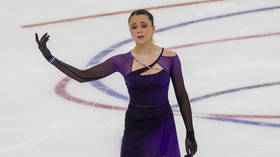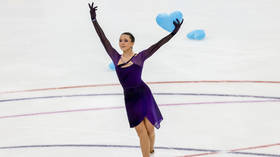Results of investigation into Valieva doping case revealed
According to WADA, a Russian disciplinary hearing found ‘no fault or negligence’ by the figure skater
A Russian tribunal has determined that Olympic figure skater Kamila Valieva bore “no fault or negligence” for the doping rule violation which triggered a major scandal at the 2022 Beijing Winter Olympics, according to the World Anti-Doping Agency (WADA).
WADA announced on Friday that it had been informed of results of the disciplinary hearing held on Valieva’s case following an investigation by the Russian Anti-Doping Agency (RUSADA).
Valieva, who was aged 15 at the time, returned a positive test for the banned heart medication trimetazidine in a sample collected at the Russian Championships in December 2021. However, the result was only reported once she had competed in the figure skating team event at the Beijing Olympic Games in February 2022 – where she helped the Russian team to gold.
WADA said in its statement that the Russian tribunal “found that although the athlete had committed an Anti-Doping Rule Violation, she bore ‘no fault or negligence’ for it.” It noted, however, that Valieva would have her results disqualified for the period of the collection of the sample – December 25, 2021 – meaning she will lose the Russian national title she won on that date.
WADA had filed a complaint in November with the Court of Arbitration for Sport (CAS) expressing dissatisfaction with RUSADA’s handling of the case and accusing it of delays.
In Friday’s statement, WADA said it had “requested a copy of the full reasoned decision, which it will review together with the case file in order to determine whether the ruling is in line with the terms of the World Anti-Doping Code.”
“However, based on the elements of the case with which WADA is already familiar, the Agency is concerned by the finding of ‘no fault or negligence’ and will not hesitate to exercise its right of appeal to the Court of Arbitration for Sport, as appropriate,” it added.
Throughout the case, RUSADA has cited Valieva’s status as a “protected person” due to her age. Speaking in December, organization president Veronika Loginova dismissed allegations that RUSADA had taken too long to resolve the case or that it had been mishandled.
Loginova commented on Friday that RUSADA itself could contest the decision by the Russian tribunal – known as a disciplinary anti-doping committee (DAC) – which is independent.
“RUSADA has not yet received the full text of the decision of the disciplinary anti-doping committee, namely its reasoning. We will conduct a legal assessment of the rationale for the decision taken by the committee,” Loginova said in comments shared by TASS.
More broadly, RUSADA is hoping to be fully reinstated by WADA after a two-year ban for alleged data manipulation came to end in December – providing a potentially more contentious backdrop for Valieva’s case, even though her issue is unrelated.
After Valieva’s sample was collected at the Russian Championships, it was sent to a WADA-accredited laboratory in Stockholm, Sweden, for analysis. The positive result was only reported after Valieva had participated in the team event at the Beijing Games, with delays blamed on Covid-related issues at the Swedish facility.
Amid intense media scrutiny, Valieva was cleared by an emergency CAS panel to perform in the individual event in Beijing, but the ordeal took its toll and Valieva finished a disappointing fourth despite being the strong favorite for gold. The title ended up being won by Russia’s Anna Shcherbakova, with compatriot Alexandra Trusova in silver.
Valieva’s team has denied any wrongdoing in the doping case, maintaining that the positive test may have come as a result of contamination from heart medication that her grandfather was taking. Russian officials also stated that Valieva consistently passed other tests.
The scandal in Beijing meant that the medal ceremony was not held for the team event, where the Russian Olympic Committee (ROC) topped the podium ahead of the USA and Japan, while Canada finished in fourth. WADA has indicated it could pursue a four-year ban for Valieva with CAS, which would mean she and the Russian team are stripped of their Olympic title.
Valieva and her compatriots have been banned from global competitions by the International Skating Union (ISU) this season because of the conflict in Ukraine. That has restricted them to domestic events, and Valieva finished second at the Russian Championships last month, behind 15-year-old star Sofia Akateva.







Comments are closed.